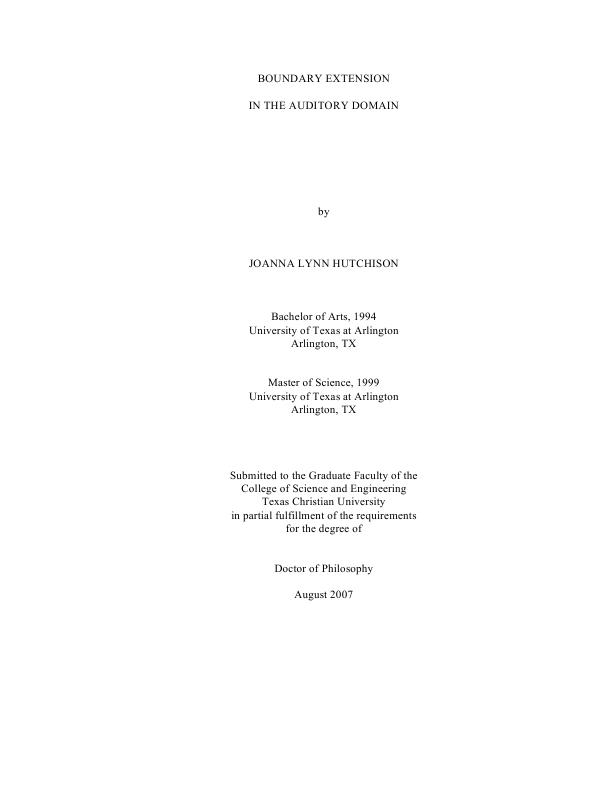Boundary extension in the auditory domainShow full item record
| Title | Boundary extension in the auditory domain |
|---|---|
| Author | Hutchison, Joanna Lynn |
| Date | 2007 |
| Genre | Dissertation |
| Degree | Doctor of Philosophy |
| Abstract | Memory for the boundaries of a scene is often extended outward--that is, observers remember a scene as containing information that was not directly perceived but that would have logically been present just beyond the observed boundaries of the scene (e.g., Intraub & Richardson, 1989). This bias is referred to as boundary extension. One reason why boundary extension might occur is that it prepares an observer to more efficiently process what might be perceived with the next fixation or in the next moment of time. Studies of boundary extension have used visual and haptic stimuli (e.g., Intraub, 2004), but boundary extension in the auditory domain has not yet been investigated despite evidence that boundary extension is multisensory in nature (Intraub, 2004).Research with representational momentum, a tendency to remember an object as having traveled further than it actually traveled (e.g., Freyd & Finke, 1984), has found biases with auditory stimuli (e.g., Hubbard, 1993).^Further, Munger, Owens, & Conway (2005) found boundary extension to occur prior to representational momentum in the visual domain, serving to establish the scene prior to the extrapolation of movement within the scene. It therefore stands to reason that auditory boundary extension exists and precedes any effects of auditory representational momentum.The goal of the present experiments was to determine whether auditory boundary extension exists. Experiments 1-3 used relatively long probes followed by targets of equal or lesser length using either simple or complex stimuli; data in these experiments pointed toward boundary restriction. After noting that boundary restriction occurred at a time delay with wide-angled stimuli in Intraub, Bender, & Mangels' (1992) experiments, an examination of close-up, prototypic, and wide-angle auditory stimuli in Experiments 4 and 5 yielded very similar results to that of Intraub et al.^(1992)--that is, boundary extension occurred for relatively closer (i.e., shorter) targets, and boundary restriction occurred for relatively wider-angle (i.e., longer) targets. Boundary extension only occurred for more continuous (i.e., music) stimuli, but did not occur for more discrete (i.e., literature) stimuli, in line with Freyd's (1987) assertion that dynamic mental representations require continuity in time. |
| Link | https://repository.tcu.edu/handle/116099117/3994 |
| Department | Psychology |
| Advisor | Hubbard, Timothy L. |
Files in this item
This item appears in the following Collection(s)
- Doctoral Dissertations [1523]
© TCU Library 2015 | Contact Special Collections |
HTML Sitemap



